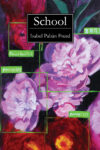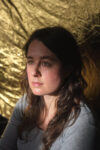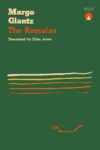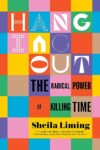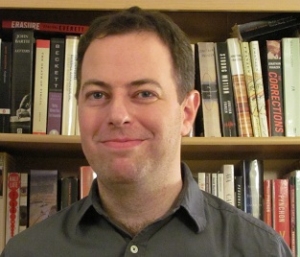 It’s not often that two writers meet without one of them thinking the other is certifiably mental. A few years ago I met Stephen J. Burn, a critic and literary scholar, in a line for British Airways-provided complimentary baguettes after a flight cancellation in Paris. Burn and I — our flights rescheduled for the following day — lit out for other territory, sharing a cab to the heart of the City of Light, a city of blissful aesthetics — iron balustrades, floral and reticulated in their welded patterns, her streets named for novelists, her restaurants for characters in their novels — but lousy acoustics: above the urban din, the irritating grate of police sirens sound throughout the municipality.
It’s not often that two writers meet without one of them thinking the other is certifiably mental. A few years ago I met Stephen J. Burn, a critic and literary scholar, in a line for British Airways-provided complimentary baguettes after a flight cancellation in Paris. Burn and I — our flights rescheduled for the following day — lit out for other territory, sharing a cab to the heart of the City of Light, a city of blissful aesthetics — iron balustrades, floral and reticulated in their welded patterns, her streets named for novelists, her restaurants for characters in their novels — but lousy acoustics: above the urban din, the irritating grate of police sirens sound throughout the municipality.
Burn and I have maintained correspondence to this day. I have since read his books and reviews, which have enormously informed my own reading and writing. What follows is an interview on the subject of criticism, a funny little enterprise existing solely, it sometimes seems, for later laughs over memorable blunders. I’ll indulge in one now — Ruth Hale’s 1925 review of The Great Gatsby: “Why [Fitzgerald] should be called an author, or why any of us should behave as if he were, has never been explained satisfactorily to me.”
At least Ms. Hale could express herself clearly. Worse yet is the critic (Burn names James Wood) whose confounding sentences lead a reader to hurl her magazine fully across a room. But Burn’s criticism, like that of Steven Moore’s or Tom LeClair’s, is elucidating, not obfuscating. He has written five books, including the first works devoted to David Foster Wallace and Jonathan Franzen, and is currently preparing an edition of Wallace’s letters for publication.
Andrew Mitchell Davenport: A few years ago you wrote a piece about reviewing for the New York Times. What do you look for in a book reviewer?
Stephen J. Burn: The hardest quality to find or assess is taste, which I realize is an unhelpfully vague term that you may suspect simply means people-whose-aesthetic-palates-overlap-completely-with-my-own. Let me try to clarify it. First, I think this means that the reviewers I trust most are people whose insights seem untainted by personal alliances, are informed by an unusual breadth of reading, and are willing to back up their value judgments with concrete evidence from the text. Over the last twenty years, probably the two reviewers in mainstream US publications who have most consistently fulfilled these criteria for me are Tom LeClair and Steven Moore. Reviews that are little more than extensions of marketing hype do writers few favors, and Tom LeClair is one of the best reviewers at seeing through the hype and responding to the book itself: its language, style, narrative design. His criticisms of other works aren’t the curmudgeonly opposition of a reviewer who simply wants to be different (there are plenty of those), but they’re the necessary opposition that lends greater weight to the praise he gives. I’m surprised his What Not to Read hasn’t received more attention. Steven Moore simply has a larger range of reference than any other reviewer, and his judgments tend to be uniquely informed by the range of literary possibilities.
Reviewers I don’t trust are those that offer either excessively breathless praise or withering contempt with little consideration of the concrete qualities of the book (and sometimes of its equally important microtradition) under review. In this respect, James Wood (especially in his later work) is something like the photographic negative of Moore: so many of his judgments rely on strawman allusions to the unexplained (but, we can be sure, unreasonably narrow) category of “the novel,” which becomes a means for critical attack whose power depends almost entirely on the extent to which it has been undefined. There’s no sense that the kind of unusually eclectic and exhaustive reading that underpins Moore’s alternative history of the novel informs Wood’s assumption that he alone possesses the right to define what the novel is or what it can do. Perhaps I’m missing something vital here, but I find it hard to understand the motivation behind many of his later reviews. His recent review of David Mitchell’s The Bone Clocks seems to crystallize much that’s awry in his work. Wood writes:
Much contemporary writing fetishizes style, and the priority is felt as a constant anxiety. Prose has to sign itself, establish its showy authority in silvery cutlass swipes through the air . . . It gets tiring to keep spotting the writer.
I can’t imagine that Wood isn’t aware of the contradiction between chastising writers for showy phrase-making, while deciding that the first five words in this quote aren’t sufficient, but require the further precision offered by “silvery cutlass swipes through the air.” Equally, there’s no other reviewer whose cutlass swipes are so off-putting that the reader has to keep spotting the reviewer. Is this deliberate self-parody? I don’t completely understand.
How many books have you read in the last year?
I moved universities, countries, and continents a little over a year ago, so the last twelve months weren’t very representative, but I’ve counted the number of novels I’ve read each year, or at least I’ve done so ever since I read an essay in which Jonathan Franzen devised a bleak algorithm for calculating how many books he could read before he died. I typically read between 30–40 novels a year, but don’t count however many nonfiction or scholarly books I get through (I prefer not to know). I’m not a particularly fast reader, but feel as if I have good spatial recall of whatever reading I do: I tend to remember quite clearly where words or phrases appear across the page space of an open book, and I have a looser recall of the fixed configuration of paragraphs on particular pages. For this reason, I don’t take information in well from scrolling computer screens, or tablets.
I assume you’re not watching much television. I’ve read that before Wallace’s death he told a colleague that the best American writing was The Wire. Is there any significance to this?
I may be wrong, but I think there is something to this. Aside from the show’s intrinsic interest for Wallace, I think he was also curious about the ways that DVD boxed sets change not just the way that we consume entertainment, but also the way the delivery system changes the parameters of the show itself — how the machinations of narrative suspense alter when the viewer may not have to wait a week for the next episode; what happens when scenes aren’t necessarily written to the rhythms of commercial breaks.
How many times did you read Infinite Jest while writing the reader’s companion?
I wrote the first edition in 2002, and I didn’t specifically re-read the whole book during this period. When I got the contract, I was in the twilight world between completing a PhD and actually having a real job, so I put the manuscript together while I was juggling three part-time teaching appointments in three different English cities. On a typical day, I’d teach in two cities, spend the evening preparing for the next day’s classes, and then start working on the manuscript for a few hours around midnight. Because of this routine, whenever I’m forced to look at the first edition, the prose always seems to me to have an insomniac sheen to it.
So time pressures were a factor, but I’d read the novel somewhat obsessively to write a dissertation chapter about it in the nineties, so I felt as if I knew my way around it. What I did do when I started the project was to go back through the book in an effort to reverse engineer Wallace’s blueprint for the novel. I mapped out its spatial and temporal coordinates by marking all the references to places and times. I was doing this for my own convenience — trying to see the novel whole — but as the map came together, I came to see that temporal sequence was much more important for Wallace than I’d expected. I like to think that my obsessive blueprint, on taped-together sheets of paper, approximates some kind of plan that once existed in Wallace’s file.
What is your vote for The Great American Novel?
Moby-Dick, especially in DeForest’s terms, but also for its many voices and willingness to reinvent itself from chapter to chapter. There are striking visual scenes — the voyage through the “vast meadows of brit” where the whales leave “behind them endless swaths of blue upon the yellow sea,” or the revolving concentric circles of the grand armada — and an unusual aphoristic richness, but for me these qualities are only part of the book’s importance. The narrative rhythm of certain long books — Moby-Dick certainly, but Proust and Wallace, too — is like a slow, steady heartbeat, and I find reading them immensely calming, even when they’re describing harrowing experiences.
Perhaps you know the answer to this: Who the heck is Evan Dara?
No comment, but I think we can rule out the rumor that he’s Richard Powers.
What is the reception in the UK of American writers like Powers, Franzen and Wallace?
Across the last fifteen years, their profile has changed more radically in the UK than in the US. When I wrote my short book on Wallace, I had literally not met another person who had read Infinite Jest, while Franzen was similarly obscure. Powers, I think, had a mildly higher profile. Now Franzen is famous enough over here for people to want to steal his glasses. Clearly that’s a special and unusual kind of celebrity. As in the US, Wallace has been transformed from a writer who people were reluctant to take seriously (if they’d even heard of him), and who was deemed profoundly derivative of Pynchon, to a writer that people fall over themselves to namecheck. This isn’t always a good thing. In both countries he exerts a magnetic attraction for younger readers — around 75% of the enquiries I get from prospective doctoral students concern Wallace. I think Powers’s best work to date was a trio of novels he published in the 1990s, but I’m mystified by why he doesn’t get more attention in the UK and the US.
What are the origins of the encyclopedic novel? And when were you first captivated by them?
I would have given you a different answer to this at different times in the last two decades, but I think the encyclopedic novel stems from two sources. First, it’s a form often adopted by writers whose nerve endings are highly attuned to the fragility of the human enterprise, and to intimations of proximate ecological disaster. This is a trait shared by the architects of the Enlightenment encyclopedia. In the preliminary discourse to Diderot and D’Alembert’s Encyclopédie, D’Alembert described the encyclopedia as a “sanctuary” where the knowledge of past ages would be “protected from time and from revolutions.” In turbulent times, writers similarly see their projects as cultural databanks shored against the gathering storm clouds, though this is obviously not to say that these writers cherish the particular craziness of contemporary existence. The second source inverts the writer’s relationship to the Enlightenment, because these books are driven to catalogue, list, and anatomize, in part to demonstrate the limitations of the encyclopedic project. As Powers writes in Three Farmers on Their Way to a Dance, “the incomplete reference book is the most accurate.”
My interest in the form can be dated to one afternoon in 1996, during my final semester as an undergraduate student at Strathclyde University. My then teacher — a guy called Stephen Baker (I was fortunate to have many good teachers) — brought in a stack of terrifyingly thick books, and explained that they were by William Gaddis, a great but largely overlooked writer. I didn’t appreciate at the time quite how aberrant it was to be assigned A Frolic of His Own on a course that otherwise paid due heed to an American canon that ran from Nathaniel Hawthorne, through Ellison, Bellow, Plath, Singer, to Toni Morrison. But Baker had evidently been in an audience of eleven people when Gaddis read in Edinburgh in the mid-nineties to promote Frolic. I probably absorbed some of the quasi-religious zeal that develops in small groups of people who like doing difficult things, but having been immersed for nearly a year in Ulysses, and having assumed that I’d spend the rest of my life as a modernist, I was more shocked by the fact that there were living writers in America who were writing novels of comparable complexity and ambition. I wanted to know what was going on — how I could talk about Ulysses and Frolic in the same sentence, and what else I might be missing while I admired already-curated masterpieces. Gaddis opened a door for me, and beyond that door were Robert Coover, Don DeLillo, Jennifer Egan, Sherman Alexie, Wallace, Franzen, Dara, A.M. Homes, Colson Whitehead, Marisha Pessl.
Who is the most underrated American novelist now writing?
My sense is that the cult of youth does a lot of the thinking for the literary media in America, and, as such, the writers who get attention are those who can make it under the arbitrary cut-off points levelled by lists of, say, the “20 under 40.” The logic of such lists is, of course, the logic of the market, the search for the new commodity. The most underrated novelists in my eyes are not emerging voices, for whom there’s a greater and greater demand, but older novelists who have persisted long enough that they resist consumption, and whose works now live out their lives through independent presses.
John Barth is a good example of a writer whose longevity has exceeded the media’s need for him to write: judgments about what Barth did hardened a long time ago, and they hardened without any real concern for whether or not a writer might change or grow. The cartoon cutout of his work that circulates is based on the lazy stereotype that his fiction is always self-referential, and preoccupied only with language, which really doesn’t map on to, say, stretches of realism in The Last Voyage of Somebody the Sailor (1991) that Updike or Franzen might envy, or the multi-levelled engagement with quantum physics in On with the Story (1996) — especially the arctic beauty of “Ad Infinitum.” Aside from the sheer quality of these works — often traditional literary quality (rather than frame-breaking acrobatics) — I particularly don’t get the supposed distance of Barth’s work from the world of social upheaval and political action. I mean, he even predicts that Osama bin Laden will imminently attack America in Coming Soon!!! (2001).
I appreciate that there are extra-literary factors at work in the media’s response to writers, and there’s probably very little that’s inherently sexy for a news story about prostate problems or whatever other afflictions older writers face when they’re away from their desks. But academics are often as culpable for this kind of neglect as reviewers, especially when they write about twenty-first-century fiction and seem to be really wishing that literary history didn’t extend back more than a couple of decades. Beyond Barth there’s a whole slew of older writers whose work doesn’t deserve to have fallen from view, but I have to mention Lee Siegel, a tremendously inventive writer whose Love and Other Games of Chance (2003), in particular, is criminally underrated.
If you could ask David Markson one more question, what would it be?
Please could you make sure that your personal library is sold to a university or library that will protect your legacy, rather than letting it be dispersed, and much of it lost, through used-book sellers?
Hypothetically speaking, if you wrote a novel what would its title be and what would it be about?
While I was waiting for my undergraduate degree results — results that would dictate whether or not the Scottish government would support my plan to go to grad school — I worked in an ice-cream store, and drew an outline for a novel about a young man who worked in an ice-cream store as a kind of contingency plan, in case I didn’t get the grades I needed. I think it’s safe to say that literary history breathed a great sigh of relief when I was able to abandon the novel, and spend the next few years hiding out in libraries.
What other jobs would you have enjoyed besides being a writer and a teacher?
In my experience, not many people can hold five ice-creams in one hand, but I was a hell of an ice-cream salesman. Having said that, I didn’t enjoy it all that much.
Andrew Mitchell Davenport is a middle school teacher, and a writer, in Brooklyn. You can find him on Twitter here.
This post may contain affiliate links.




